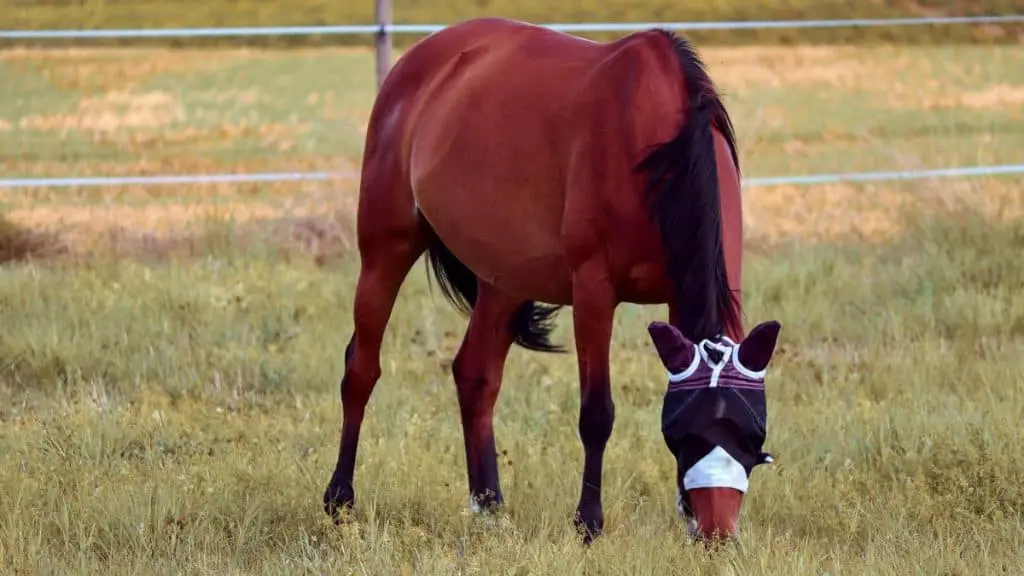Horses have their eyes covered to protect them from flying insects, the sun’s UV rays, and dust. The covering is called a fly mask and is an essential piece of gear for a horse in summer and during any heat spells.
You have probably seen horses in fields that look like they’re wearing a blindfold. This may have seemed a little strange because it looks like the horse won’t be able to see or hear! These are actually called fly masks and are there to protect the horse.

Luckily, a horse’s fly mask is semi-transparent so they can still see and hear. There are many different types on the market and as long as the mask is fitted correctly, it will not irritate the horse (not as much as flies!).
Why Do Horses Have Their Eyes Covered With Fly Masks?
There are three main reasons that owners put fly masks on their horses: to protect against flies, UV rays, and dust. These are all in the name of making the horse feel more comfortable and preventing injury.
It’s also common for a horse to wear a fly mask if they are recovering from an eye injury. This is so the above three issues mentioned don’t make it any worse and to aid a speedy and full recovery.
1. To Protect Against Flies – A Horse’s Number One Flying Enemy
Flies love horses and you will find swarms around them in the hotter months. This is a nuisance to horses and their owners. It can also be dangerous for a horse because it can lead to an infection and other diseases.
Flies are particularly attracted to horses’ eyes. This can become unbearable when there are hundreds of flies buzzing and crawling around relentlessly.
Horses stamp their hooves to shoo them away from their belly and legs and swish their mighty tails to get rid of them from behind. Trying to remove flies from their face is much harder for them particularly if a horse isn’t endowed with a full mane and forelock.
Flies can transmit diseases to a horse’s eye so that’s why owners prefer to ward them off by using fly masks. Stable flies are attracted to the corners of a horse’s eye and this leads to irritation and potentially conjunctivitis or corneal ulcers. They can be a big problem in the fall.
2. To Protect Against Sunlight And Damaging UV Rays
A horse’s fly mask also offers UV protection acting as a pair of sunglasses, only harder to shake off. Like us humans, horses can also fall victim to cancer.
Squamous cell carcinoma is a common type of horse cancer that is often found in their eyes. Horses at the greatest risk have unpigmented or blue eyes. Fortunately, some fly masks can provide up to 95% UV protection. It also reduces the glare if they’re outside all day.
3. To Protect Against Dust And Particles
Wearing a fly mask also protects horses against the danger of dust. If a horse gets dust in its eye it can become irritated and inflamed.
If it’s a windy day outside, it’s even more likely that dust will get inside a horse’s eye. It can also help inside a stable when cleaning has stirred up particles.
4. Wearing A Fly Mask Will Help A Horse Recovering From An Injury
It’s especially important that horses wear a fly mask when they are recovering from an eye injury. While it’s in recovery, the horse definitely doesn’t want any dust or flies to get in.
Common eye conditions for horses are:
- Corneal ulcers – They are particularly susceptible to these because of the large size of their eyes.
- Lacerations – These often stem from trauma but there is a good chance of recovery if treated with care.
- Conjunctivitis – Like us, horses will experience redness, swelling, and discharge.
- Uveitis – This is an inflammatory condition and treatment involves putting a topical medication over the area, making it essential to keep insects away.
What Are The Different Types Of Fly Masks Available?
All horses are different and there are various types of fly masks available to suit their different shapes and needs.
The main types used are the:
- Full face fly mask – This covers the face and eyes including the horse’s muzzle. It also comes with ear covers.
- Fly mask with ears – This covers the eye area and ears but doesn’t extend down to the muzzle.
- Fly mask without ears – Many horses are sensitive to anything touching their ears so these masks just cover the eye area.
Detailed Information If You Own Or Are Buying A Horse
If you have just bought a horse or are about to congratulations! There are some important factors you need to know about using fly masks.
The most important thing is to keep your horse happy and comfortable. If it’s doesn’t appreciate the mask being attached it will try (and probably achieve) removing it. However, if the mask fits well and you follow a few top pointers this shouldn’t happen.
Here are some things to make sure you do:
- Buy a mask that is made of nonabrasive material and has a soft lining at the points where it touches your horse’s face.
- Make sure that the mask fits. You couldn’t fit the same cap on every person’s head and it’s no different with horses. Different breeds and genes will play a role in determining how large a horse and its head are. The most important consideration is that the mask does not touch your horse’s eyes or eyelashes. If it touches it can lead to a corneal ulcer.
- Keep the mask clean to avoid skin infections and collected debris falling into your horse’s eyes. Consider buying an extra mask so you can rotate them easily and have a spare.
Here are some things to make sure you don’t do:
- Tighten the mask against its face and jaw. There should be space between the horse’s face and the mask otherwise it can cause discomfort and even create sores.
- Leave the fly mask on at night unless the vet recommends doing so due to a medical problem.
Now, the next time you see horses wearing a fly mask you’ll know that they are perfectly capable of seeing and are essentially wearing goggles or sunglasses. Most probably, they are relishing the relief from the flying insects, any dust, and sunshine.
References
- https://horsesidevetguide.com/drv/Observation/1039/eyes-are-bothered-by-flies/
- https://equinewellnessmagazine.com/sun-exposure/
- https://thehorse.com/191427/common-equine-eye-conditions/
- https://www.equilibriumproducts.com/wellbeing/the-essential-guide-to-choosing-the-perfect-fly-mask/
- https://horseandrider.com/gear/fly-masks-dos-donts
